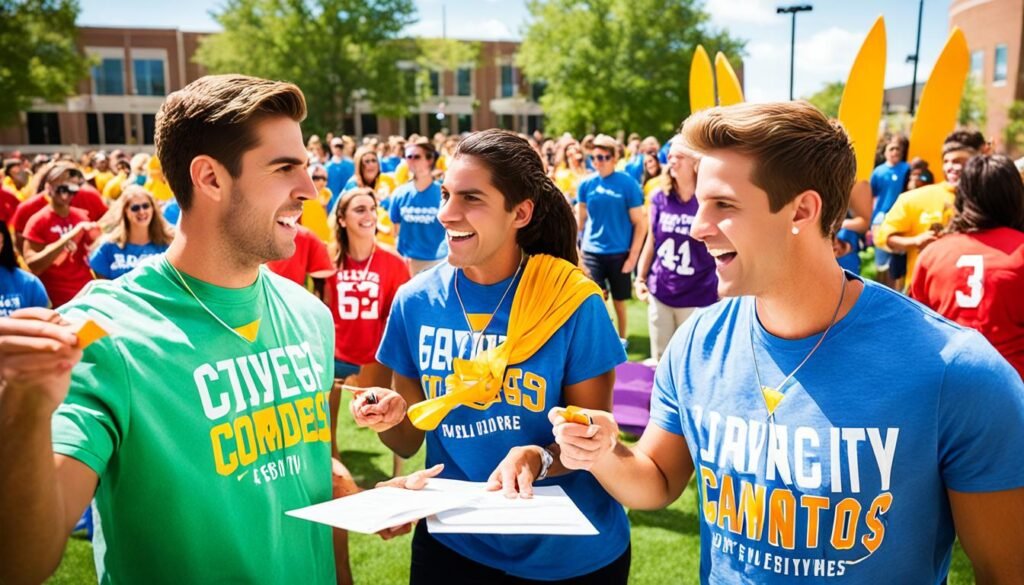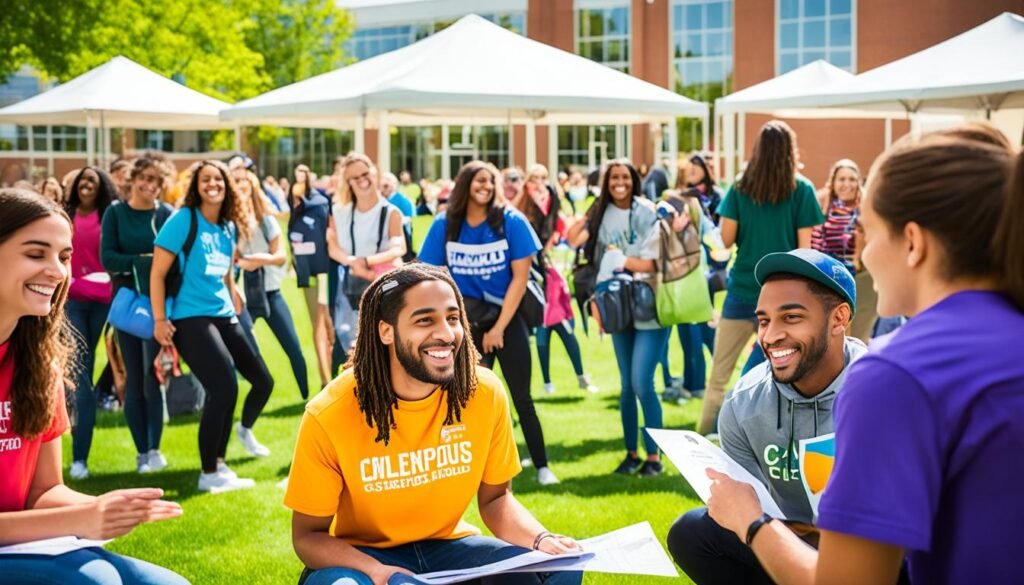Navigating the transition to college can be an exciting yet daunting experience for many first-year students. To ensure a seamless and successful start, The Continents States University offers a comprehensive first-year student orientation program. This program is designed to equip incoming students with the skills, tools, and opportunities needed to integrate into the workforce industry around the globe.
The Continents States University’s orientation program provides a valuable opportunity for new students to explore the campus, select their courses, and attend academic seminars that will set them up for academic success. By participating in this program, students can gain a deeper understanding of the university’s resources, campus life, and the logistics of their academic journey.
Key Takeaways
- The Continents States University offers a comprehensive first-year student orientation program to help new students transition to college life.
- The orientation program covers campus exploration, course selection, and academic seminars to prepare students for their first semester.
- Participating in the orientation program provides students with the skills, tools, and opportunities needed to integrate into the workforce industry.
- The program aims to ensure a seamless and successful start to the college journey for incoming students.
- The orientation program aligns with the university’s mission to deliver affordable, quality, and competency-based education to everyone across the continents.
What is a First-Year Student Orientation Program?
Transitioning to college can be an exciting yet overwhelming experience for new students. That’s where a first-year student orientation program comes in. These programs are designed to help incoming freshmen familiarize themselves with the campus, select their courses, and attend informative academic seminars.
Exploring the Campus
During the college orientation activities, students have the opportunity to explore the campus and learn about the various facilities, resources, and student life opportunities available to them. This helps new students feel more comfortable and confident navigating their new academic environment.
Selecting Courses for the Semester
Meeting with academic advisors is a crucial part of the college orientation process. Advisors guide students in selecting appropriate courses for their first semester, ensuring they meet degree requirements and align with their academic and career goals.
Attending Academic Seminars
The college orientation program also includes informative seminars about academic expectations, degree requirements, and student support services. These sessions help new students understand the rigor and demands of college-level coursework and the resources available to support their success.

By participating in a comprehensive first-year student orientation program, new students can smoothly transition to college life and set the foundation for their academic journey.
Preparing for Orientation at The Continents States University
As incoming students at The Continents States University, it’s important to complete several pre-orientation tasks before attending the on-campus orientation program. This preparation process helps ensure a smooth and informative transition to college life.
First and foremost, students should submit any required documentation, such as proof of citizenship and immunization records. Completing these administrative tasks ahead of time will save time and reduce stress during the orientation process. Additionally, students should take the time to fill out any roommate questionnaires or other forms that the university may request.
Another crucial step in preparing for college orientation is to compile a list of questions. Orientation sessions cover a wide range of topics, from new student orientation requirements to campus life and academic logistics. By having a prepared list of questions, students can make the most of their time and ensure they leave orientation with a comprehensive understanding of what to expect during their first year.
By completing orientation pre-planning tasks and coming prepared with questions, incoming students at The Continents States University can set themselves up for a successful and informed start to their college journey.

Questions to Ask During College Orientation
The college orientation program is a valuable opportunity for new students to learn more about their university and get their questions answered. At The Continents States University, incoming freshmen should take advantage of this orientation to inquire about various aspects of campus life, academic logistics, and financial matters.
Campus Living
One of the first topics new students often ask about is campus housing. Questions about the location of dormitories, available amenities, and food options on and off campus are common during orientation. Understanding the campus living situation can help students plan and prepare for a smooth transition to college life.
Academic Logistics
Navigating the academic side of college can be daunting for first-year students. During orientation, they may inquire about the course enrollment process, policies for dropping or adding classes, and how credits from Advanced Placement (AP) exams can be applied. Getting a clear understanding of academic logistics ensures students start the semester on the right foot.
Financial Matters
Another key area of questions during college orientation revolves around tuition, fees, and financial assistance. New students may ask about payment deadlines, where to pay tuition, and what scholarship or grant opportunities are available. Addressing these financial questions for college orientation helps students plan for the costs of academic enrollment and make informed decisions about tuition and fees.

First-year student orientation program details
The Continents States University’s first-year student orientation program is designed to provide incoming students with a comprehensive introduction to campus life and academic expectations. Participating in this orientation program is a crucial first step in ensuring a smooth transition to college and a successful start to the academic year.
The orientation program covers a wide range of topics, from exploring the campus and selecting courses for the semester to attending academic seminars and familiarizing oneself with the university’s resources. This comprehensive approach aims to equip new students with the knowledge and tools they need to navigate the college experience with confidence.
During the orientation, students will have the opportunity to connect with faculty, staff, and fellow first-year students, fostering a sense of community and belonging that can be invaluable in the college transition. The program also addresses practical matters, such as campus living, academic logistics, and financial considerations, ensuring that new students are well-informed and prepared for the journey ahead.

By participating in the first-year student orientation program, new students can take the first steps towards a successful college experience, building a strong foundation for their academic and personal growth. The program’s focus on the college transition, new student onboarding, and comprehensive support sets the stage for a transformative journey at The Continents States University.
Orientation Schedule and Sessions
The Continents States University offers a comprehensive first-year student orientation program throughout the summer of 2024. These orientation sessions are designed to help incoming students familiarize themselves with the campus, select their courses, and learn about the university’s academic and support resources.
Summer 2024 Dates
The college orientation schedule includes a series of sessions scheduled from July through September. Specific dates are reserved for international and out-of-state students to ensure they have ample time to acclimate to the campus and community.
Daily Orientation Activities
During the one and a half day orientation sessions, students will engage in a variety of activities, including campus tours, academic seminars, and course registration. These daily activities are aimed at empowering first-year students to make a smooth transition to college life at The Continents States University.
Cost and Billing for Orientation
Attending the first-year student orientation program at The Continents States University comes with a fee of $500. This comprehensive package covers the two-day, one-night event, including on-campus housing and meals. However, there are also optional fees for those who require early arrival or an extended stay, particularly for non-California residents.
The orientation fee is billed directly to the student’s account after the completion of the session. This allows students the flexibility to pay the balance in installments, making the program accessible to a wider range of incoming students. The university also recognizes the financial challenges that some families may face, and thus offers various financial assistance options.
Financial Assistance Options
Students who receive a Pell Grant can take advantage of full coverage for the college orientation fees. Additionally, the university provides payment plan options to help manage the costs more effectively. These flexible payment arrangements ensure that the first-year student orientation program at The Continents States University remains accessible and inclusive for all incoming students, regardless of their financial background.
Academic Advising and Course Enrollment
The college academic advising process plays a crucial role in the first-year student orientation program at The Continents States University. During the orientation, students will have the opportunity to meet with their academic advisors individually to review degree requirements and select appropriate courses for the fall semester.
The university ensures that seats are reserved in high-demand general education and major courses, so first-year students have the chance to enroll in the classes they need, regardless of which orientation session they attend. This approach helps to streamline the course enrollment process and ensures that new students can build a schedule that aligns with their academic goals and degree plan.
The academic advising sessions during the first-year student orientation program at The Continents States University are designed to provide personalized guidance and support to incoming students. By working closely with their advisors, students can navigate the course selection process with confidence and set themselves up for success in their first semester and beyond.
Placement Exams for New Students
As students prepare to begin their academic journey at The Continents States University, they may need to complete one or more placement exams during the orientation program. One of the key assessments is the Analytical Writing Placement Exam (AWPE), which is used to evaluate a student’s proficiency in English composition.
The AWPE is designed to assess a student’s readiness for college-level writing tasks. Students who have not yet satisfied the university’s Entry Level Writing requirement will be required to take this placement exam, which is offered on specific dates during the summer orientation sessions.
Writing Placement Exam
The writing placement exam is an important step in ensuring that students are placed in the appropriate college placement exams and writing assessment courses to meet the entry-level requirements of the university. By identifying a student’s current writing skills, the AWPE helps the academic advisors recommend the most suitable courses and resources to support the student’s success in their academic program.
During the orientation program, students will have the opportunity to complete the AWPE and receive their results, allowing them to plan their course schedule and academic support accordingly. This placement exam is a crucial component of the first-year student orientation, helping to set the stage for a successful college experience.
Conclusion
The Continents States University’s first-year student orientation program is an invaluable resource for incoming students seeking a seamless transition to college life. By participating in this comprehensive program, new students can acquire a thorough understanding of campus facilities, select their academic courses, and address any financial or logistical concerns. This orientation process ensures that first-year students are well-prepared to embark on their academic journey, fostering a successful and rewarding college experience.
The orientation program’s multifaceted approach covers a range of essential topics, from exploring the campus and attending academic seminars to learning about campus living and financial assistance options. This holistic preparation empowers new students to navigate the complexities of college life with confidence, setting them up for academic and personal growth throughout their time at the university.
Ultimately, the Continents States University’s first-year student orientation program is a critical component in helping incoming students acclimate to the college environment and lay the groundwork for a fulfilling collegiate experience. By providing the necessary tools and guidance, the university ensures that new students are equipped to thrive, both in the classroom and within the vibrant campus community.
Source Links
- What is College Orientation for First-Year Students? – https://blog.collegeboard.org/what-college-orientation-first-year-students
- First-Year Orientation Dates & Schedules – https://nsfp.unc.edu/students/first-year-students/first-year-new-student-orientation/first-year-orientation-dates-schedules/
- Orientation -First Year Students: UCLA New Student & Transition Programs – https://newstudents.ucla.edu/programs/first-year-students/


